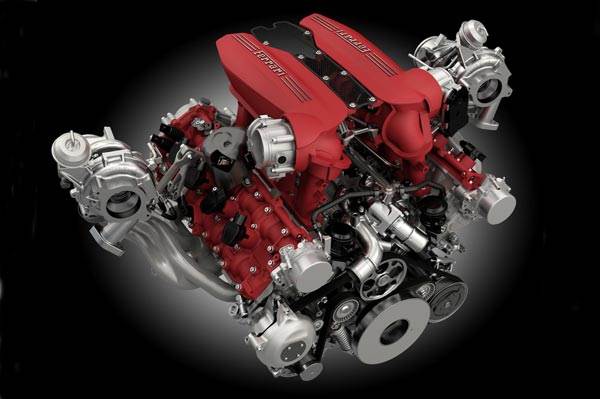Ferrari’s 3.9-litre twin-turbo V8, which powers the 488 GTB, has clinched the 2016 International Engine of the Year award becoming the first engine over six cylinders to grab the top spot in a decade. Moreover, the 3.9-litre V8 also won top honors in the ‘New Engine’, ‘Performance Engine’ and the ‘3.0 to 4.0-litre’ categories.
In 2006, BMW’s 5.0-litre V10 won the top award, but since then downsizing seems to be the common thread among all the winners. The BMW 3.0-litre twin-turbo won the award for the next couple of years but engine capacities dipped steeply with the VW 1.4-litre TSI scooping up the top honors in 2009-10. Then Fiat’s 875cc emerged winner followed by the a three-year dominance of Ford’s 999cc EcoBoost, followed by BMW's 1.5-litre three-cylinder engine from the i8 last year.
“At first glance it would seem the winning powertrain takes this downsizing trend and rips up the rulebook… The 488 heart is proof that performance cars – and all passenger cars – need not fear the downsizing trend,” said the awards committee.
“It was the powertrain’s sophisticated design – loaded with advanced technologies – that saw off a serious challenge from last year’s winner, BMW’s i8 PHEV creation, as well as Porsche’s new straight-six turbo in the 911, to take top honours,” Dean Slavnich, co-chairman of the International Engine of the Year Awards said.
BMW, however, still had reason to cheer as its 1.5-litre petrol-hybrid motor was pronounced the best engine in the '1.4 to 1.8-litre' category class. The i8 features a 228hp petrol engine driving the rear wheels with a 132hp electric motor powering the front axle.
Tesla’s full-electric engine powering its Model S and Model X won the 'Green Engine' trophy and with that, Tesla became the first carmaker to clinch this title for three consecutive years.
Ford’s 998cc three-cylinder EcoBoost was adjudged the winner for the fifth consecutive year in the sub-1.0 litre category,. The engine powering the EcoSport has managed to bag the award despite losing its grip over the International Engine of the Year Award. Some of the judges felt the unit was still the best in its class, thanks to high torque delivery at the low end.
In the '1.0 to 1.4-litre' category, the PSA Peugeot Citroën 1.2-litre three-cylinder turbo retained the award it won last year when it had displaced Volkswagen’s 1.4-litre TSI engine, which was a winner in this category for a whopping nine consecutive times.
The Mercedes-AMG 2.0-litre turbo engine powering the Mercedes A45 AMG, CLA 45 AMG and the GLA45 AMG, won the award in the '1.8 to 2.0-litre' category for the second consecutive year. In the past 10 months, the high-performance powertrain has witnessed key revisions such as the fitting of a new valve assembly and tweaking of the engine timing, both of which have resulted in a bump in power and torque. The fight for the top spot was a closely contested one with Audi’s 2.0-litre four-cylinder TFSI, which powers cars including the TT, A4 and the VW Beetle and Superb, coming in second.
Audi’s 2.5-litre five-cylinder turbo remained dominant this year in the '2.0 to 2.5-litre' category, a position it has retained six consecutive times. The unit, which displaces 340hp and 466Nm torque in the RS Q3, has been recently included in the RS 3(367hp). It staved off competition from Porsche’s 2.5-litre turbo which drives the 718 and the Boxster S. Interestingly, the 2.5-litre turbo will also power the most powerful Audi TT yet, the new TT RS.
Big news in the '2.5 to 3.0-litre' category was that Porsche’s new 3.0-litre six-cylinder (Porsche 911 Carrera, 911 Carrera 4), which had stunned purists due to the addition of turbos unseated BMW's dominant 3.0-litre twin-turbo (M3, M4) that has earned victory in this category a staggering 14 times. The new Porsche 3.0-litre engine comes in two states of tune – 370hp and 420hp – while torque figures have gone up significantly by 60Nm to 450Nm and 500Nm depending on the model.
In the 'Above 4.0-litre' category, Ferrari’s 6.3-litre V12, powering the F12tdf, was given the best engine award. Other engines the Ferrari’s naturally aspirated unit had to beat were the 5.2-litre V10 from Audi (R8 range), and Mercedes-AMG’s 5.5-litre V8 turbo (E63, S63).
The jury of the International Engine of the Year Awards comprised a panel of 63 motoring journalists from 31 countries.
| International Engine of the Year Award | |
|---|---|
| Engine Category | Winner |
| New Engine | Ferrari 3.9-litre twin-turbo V8 |
| Green Engine | Tesla full-electric powertrain |
| Performance Engine | Ferrari 3.9-litre twin-turbo V8 |
| Sub 1-litre | Ford 998cc three-cylinder turbo |
| 1-litre to 1.4-litre | PSA Peugeot Citroën 1.2-litre three-cylinder turbo |
| 1.4-litre to 1.8-litre | BMW1.5-litre three-cylinder petrol-electric hybrid |
| 1.8-litre to 2.0-litre | Mercedes-AMG 2-litre turbo |
| 2.0-litre to 2.5-litre | Audi 2.5-litre turbo |
| 2.5-litre to 3.0-litre | Porsche 3-litre six-cylinder turbo |
| 3.0-litre to 4.0-litre | Ferrari 3.9-litre twin-turbo V8 |
| Above 4.0-litre | Ferrari 6.3-litre V12 |
| International Engine of the Year | Ferrari 3.9-litre twin-turbo V8 |



Comments
Member Login
Personal Details
No comments yet. Be the first to comment.